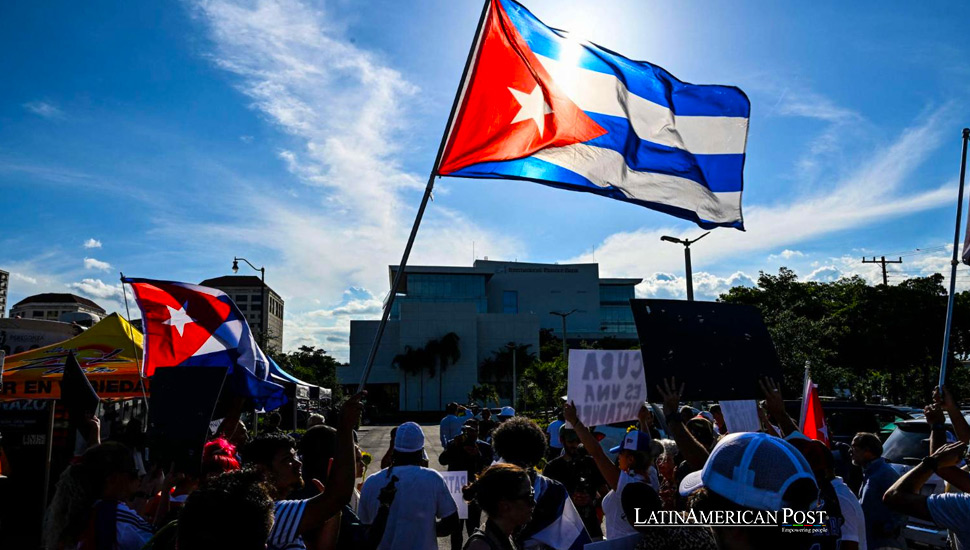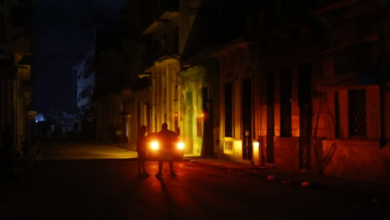Cuba’s Cry for Change: Rare Protests Spark Wider Latin American Dialogue

In Santiago, Cuba’s second-largest city, hundreds protested against prolonged power outages and food scarcity, highlighting the island’s severe economic turmoil. This crisis, echoing across Latin America, raises questions about governance, U.S. sanctions, and the struggle for necessities.
In Santiago, Cuba’s vibrant yet strife-ridden streets, a rare public outcry unfolded as hundreds voiced their frustration over persistent power blackouts and acute food shortages. This public demonstration marks a critical moment for Cuba. It is trapped in its gravest economic downturn in three decades, characterized by extensive daily power outages and a dire scarcity of essential commodities.
Lying 800 kilometers east of Havana, Santiago erupted in chants of “power and food” as its residents confronted the grim realities of their daily existence. The city, emblematic of broader national distress, experienced power restoration and received emergency food supplies only after the protest, signaling the government’s reactive measures to quell public discontent.
Economic Turmoil and Governmental Response
Cuba’s economic landscape, beleaguered by years of mismanagement and exacerbated by the COVID-19 pandemic, has led to widespread food, fuel, and medical supply shortages. The government’s recent appeal to the UN’s food program underscores the severity of the crisis, particularly in addressing the nutritional needs of young children.
The Cuban government, led by President Miguel Diaz-Canel, attributes the economic hardship to the longstanding U.S. embargo, which has severely restricted trade and contributed to the nation’s isolation. Critics, however, argue that governmental mismanagement significantly affects the country’s economic downfall. In response to the growing unrest, Diaz-Canel has expressed a commitment to address the grievances through dialogue and efforts to alleviate the situation. However, concrete results remain to be seen.
Fuel Price Hikes and Inflation Surge
Amidst these challenges, the Cuban government’s decision to significantly increase fuel prices has added fuel to the fire, so to speak, further straining the already burdened populace. This price hike, part of a broader economic recovery strategy, has made fuel five times more expensive, intensifying the cost of living and operational costs for businesses and services, including the crucial power generators.
The deteriorating economic conditions have prompted a record exodus of Cubans seeking better prospects in the United States, signaling a loss of hope among many for a viable future in their homeland. This migration trend reflects a broader narrative of discontent and despair that has plagued Cuba for years.
Latin American Echoes: Regional Reflections on Cuba’s Crisis
The situation in Cuba resonates with various countries across Latin America, where economic instability, governance issues, and external pressures, such as international sanctions or diplomatic tensions, similarly affect the populace. Nations like Venezuela, Nicaragua, and others in the region have faced comparable challenges, prompting a collective introspection on governance, economic policies, and the quest for sustainable development amidst geopolitical complexities.
The international community, including the United States, has expressed concern over the protests and the underlying economic and social turmoil in Cuba. Calls for respecting human rights and addressing the legitimate needs of the Cuban people underscore the broader debate on the responsibility of governments to ensure the welfare of their citizens and the role of international diplomacy in fostering or hindering economic recovery and social stability.
Looking Ahead: Cuba’s Path Forward
As Cuba grapples with its multifaceted crisis, the road ahead necessitates a balance between addressing immediate humanitarian needs and implementing long-term economic reforms. The global and regional discourse surrounding Cuba’s plight highlights the intricate dance between internal governance, external influences, and the unyielding spirit of a population striving for change and dignity.
Also read: Cuba’s Aging Crisis: Private Caregivers Fill the Gap
The protests in Santiago de Cuba are not just a plea for power and food but a symbol of a broader struggle for rights, governance, and survival. They ignite a conversation that extends beyond Cuba, touching on fundamental issues of economic justice, political accountability, and human rights that resonate across Latin America and the world. As Cuba seeks pathways to recovery and reform, the echoes of its people’s cries in Santiago’s streets will undoubtedly reverberate, urging a reexamination of policies, practices, and perspectives that shape the lives of millions in the region.





